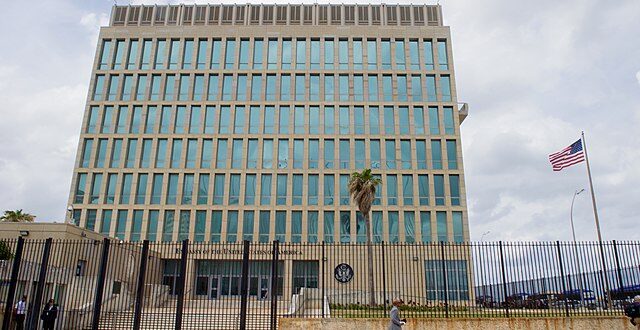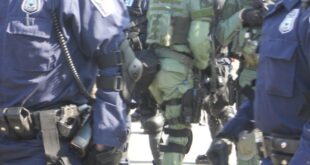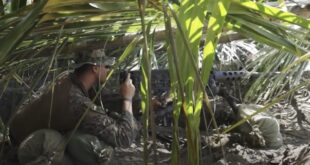Known as Unit 29155 of the GRU, the squad has been connected with extreme subterfuge.
by Susan Katz Keating
A new investigation claims that the mysterious Havana Syndrome, which has afflicted U.S. diplomats and intelligence agents, and at least one Pentagon official, may be the work of a Russian military intelligence unit that specializes in assassination and sabotage. Investigators for years have suggested that this hit squad, known as Unit 29155 of the Russian GRU, has been connected with extreme subterfuge. What is this unit, and how did it evolve?
Unit 29155 emerged in 2008 from the the Main Directorate of the General Staff of the Armed Forces of the Russian Federation, otherwise known as the GRU, experts say. It was formed in the wake of Russia’s war on Georgia. It now reportedly is connected to the Russian military’s Special Operations Forces Command. The unit is believed to be commanded by Major General Andrei Averyanov.
The squad remained largely under the radar for a decade, until media outlets began investigating a bizarre incident wherein a former Russian military officer and his daughter – Sergei and Yulia Skripal – were poisoned in 2018 with nerve agent in the U.K.
The Skripals survived the poisonings, but a British woman died after she happened to pick up a vial of the nerve agent, thinking it was perfume.

The house where the Skripals lived in Salisbury, England.
One media outlet, The Insider, already suspected that Moscow maintained a special assassination squad to kill people outside of Russia.
“So we started looking at this unit then,” said Christo Grozev, head of investigations at The Insider, which focuses on Russia. Grozev and other journalists began tracing travel records, passport numbers, phone records and other information connected to the alleged assassins. “We found who they really were, the real identities.”
Those identities helped unravel a wider unit whose operatives are suspected of a plotting a coup in Montenegro, poisoning a Bulgarian arms dealer, and other surreptitious acts.
In a wide ranging interview on his company’s website, Grozev said his investigators identified around 70 assassins who travel the world, “blowing up bridges and blowing up munition facilities, killing people and infiltrating opposition diaspora groups of Russia. So that’s who they are.”
Unit 29155 also has been linked to at least one attempted cyberintrusion, according to a report from RFE/RL.

A pin denoting the GRU
“In October 2018, Dutch officials said that GRU agents allegedly tried to hack into the computers at the headquarters of the Organization for the Prohibition of Chemical Weapons in The Hague,” journalist Mike Eckel wrote. “The organization was deeply involved in the investigation of the substance used in the Skripal poisoning.”
How does the shadowy unit factor in to the debilitating Havana Syndrome that currently is in the news?
The syndrome is characterized by severe dizziness, nausea, debilitating headaches, and problems with hearing and coordination. It first came to public attention in 2016, when American officials stationed in Havana, Cuba, reported the alarming symptoms. Since 2014, similar symptoms have been observed among employees of the US and Canadian embassies in different countries.
American officials last year claimed that it was “very unlikely” a foreign adversary was responsible for the ailment. But a year-long joint investigation by The Insider, 60 Minutes, and Der Spiegel found otherwise.
The journalists reported that members of Unit 29155, had been placed at the scene of reported health incidents involving U.S. personnel.
The investigation revealed that symptoms of the “Havana Syndrome” were observed among foreign diplomats during the same periods and in the same places where employees of military unit 29155 of the GRU visited.
This connection is bolstered by the flight data of GRU employees, who since 2014 can be placed where cases of “Havana Syndrome” occur.
In November 2014, an employee of the American consulate in Frankfurt fell ill with the syndrome, and recognized one of the likely attackers as an alleged GRU officer, Yegor Gordienko.
Another incident occurred in 2017 in China, where doctors noted “an unknown environmental impact that caused a traumatic brain injury” in an American who worked with classified information.
A similar incident took place in 2021 in Tbilisi. The wife of an American diplomat saw through her window a man she recognized as being Andrei Averyanov’s son. The woman soon developed the familiar symptoms.
Other incidents possibly occurred in 2021 in Belgrade and Hanoi, investigators said.
The Kremlin on Monday said claims that Russia caused the Havana Syndrome attacks were “baseless” and “unfounded,” and are part of a larger effort to discredit Moscow.
“This is not a new issue, it’s been talked about in the press for years, and it’s often connected with accusations against the Russian side,” Kremlin spokesman Dmitry Peskov told reporters.
The alleged agents who have been exposed, meanwhile, will need to change their work habits, Grozev said.
Those people “who can no longer travel to Europe and blow things up here and in the U.S. most likely will be recycled as advisors or as trainers or as assassins in Africa and the Middle East,” Grozev said.
The Kremlin did not immediately return a request for comment.
Susan Katz Keating is the publisher and editor in chief at Soldier of Fortune.
 Soldier of Fortune Magazine The Journal of Professional Adventurers
Soldier of Fortune Magazine The Journal of Professional Adventurers






